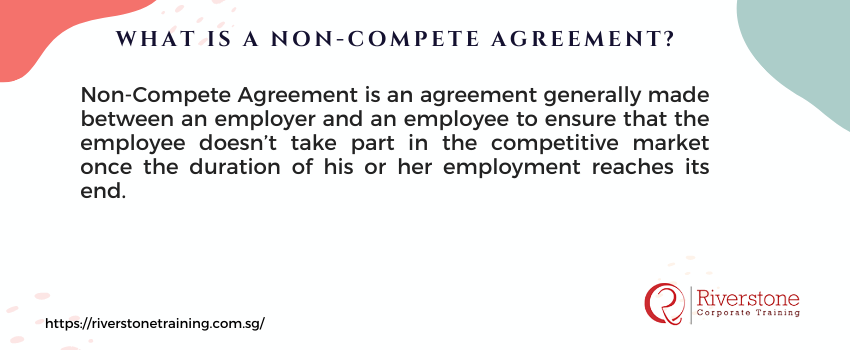
What is a Non-Compete Agreement?
A Non-Compete Agreement is an agreement generally made between an employer and an employee to ensure that the employee doesn’t take part in the competitive market once the duration of his or her employment reaches its end. It is a clause which is made between the employees of a particular company and the employer, dictating that the employee could not take part in any projects that are in direct competition with the employer or the company. It means the employee cannot join another company that is competing with his previous one or even start up a new business in the same field, which might pose as a competition to the company he signed the agreement with.
Why is this done?
There are two main reasons why an employer asks an employee to sign a non-compete agreement:
- One of the reasons is that the employer wants to protect certain crucial and sensitive information regarding his company. When an important employee leaves, it becomes quite possible for the employee to divulge critical information regarding his previous company to a competitive one, in the same market. A Non-Compete Agreement protects the company against something like that.
- It protects the company from a loss of clients and projects. When an employee stays in a particular company for a long time, he or she becomes well acquainted with the business concepts and the clients. After their employment is terminated, it becomes quite possible for them to steal the clients from their previous company. They can do this to benefit their new one or their own startup business in the same market, posing a serious threat to their previous workplaces. The Non-Compete Agreement makes sure it doesn’t come to this.
What is the duration of this agreement?
The agreement is set after the termination or the end of the employee’s employment. There is no specific period for which it is set, but it is advised to take legal counsel before the setting of the dates, to make sure that they are stretched for a realistic duration of time, and not for perpetuity.
Keys terms of Non-compete Agreement:
Here are some of the key terms found in Non-Compete Agreements:
- There has to be a proper and effective date from which the agreement period will start.
- There has to be a solid reason for the enactment of the agreement.
- Specific dates are determining the period during which the employee can’t take part in competitive projects along with the geographical location covered.
- Details regarding how the concerned parties will be compensated in case the agreement is breached.
Application of Non-Compete Agreement:
Non-Compete Agreement can be put into an application between two or more individuals. It is set between the following parties:
- Employees and Employers: This is one of the most common applications of Non-Compete Agreements. An employer can make an employee sign a Non-Compete Agreement to ensure that upon the termination of his or her employment, he or she will not solicit with another company in direct competition with the previous one. This agreement also ensures that the employee will not disclose any critical or sensitive information, or undertake any projects competing with the company he agreed with.
- Independent Contractors: A company may call in independent contractors to deal with the internal company issues, and they might have to sign the Non-Compete Agreement.
- In Mergers and Acquisitions: It is also a common practice for sellers and investors to be bound in a Non-Compete Agreement during Mergers and Acquisitions. It is done legally to restrict the seller from opening a new business in direct competition with the old one, from the money he or she has achieved by selling the old business to the investor. This clause is often thoroughly discussed in a mergers and acquisitions training program to help professionals understand its legal implications and strategic importance.
Navigating Non-Compete Clauses in Singapore:
Produce a step-by step employee centered guide to know how to make out non-compete agreements including a guide as to how to negotiate and challenge a non-compete agreement in Singapore. This content is to inform the employees about what they should seek in their contracts, their rights under the Singapore law (reasonableness test and fair proprietary interest), and consequences of signing such clauses to their future career mobility. Add to it practical recommendations on negotiating conditions, hiring a lawyer, what to do in case of a conflict, which may or may not include some local examples of cases or Ministry of Manpower (MOM) rulings to enforce local applicability. This guide can also be supported by customised corporate training solutions in Singapore and interactive e-learning development services Singapore to help both employers and employees understand the proper structure and implications of non-compete agreements.
Crafting Effective and Legally Sound Non-Compete Agreements Application:
Design a complete guide to employers in Singapore about how to draft better non- compete agreements that will have a higher potential of being enforced as well as being functional. This information must underline the need to adapt the clauses to the roles and the industries of the Singaporean case and not focusing on commonplace templates. Discuss the main streams of defining the term of legitimate proprietary interest, of reasonable duration and geographical area as well as the inclusion of non-compete clauses together with any other restrictive covenants (such as non-solicitation or confidentiality clauses). Give the examples of properly formulated clauses and clarify the so-called blue pencil test when associated with the Singaporean legal perspective and mention practical pieces of advice how to reduce legal risks and to avoid harming the bona fide business interests. This content can be complemented by referencing NDA best practices for Singapore businesses and reinforced by insights from a compliance training course for professionals to ensure legal alignment and enforceability.


